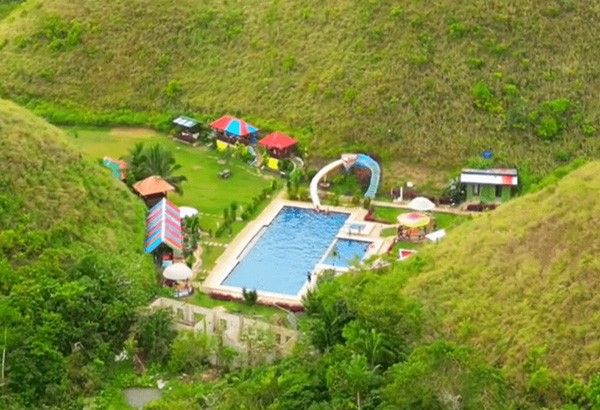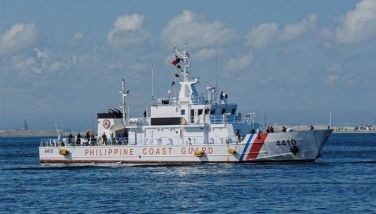Chocolate Hills resort's operation remains uncertain as gov't study continues

MANILA, Philippines — The Department of Environment and Natural Resources (DENR) said it is studying whether the controversial Captain’s Peak Resort located within the vicinity of the Chocolate Hills should be allowed to operate once it complied with the necessary documents.
DENR Undersecretary Juan Miguel Cuna made the announcement during a press conference on Friday, a day following the issuance of a cease and desist order by the agency's Region 7 office to stop the resort's operations.
“We have to sit down and study with everybody else including the local government unit (LGU) and the rest of the members of the Protected Area Management Board (PAMB) whether this establishment should be allowed to open,” he said.
“This where we are right now, and we are closely monitoring the Captain’s Peak to ensure that they remain closed and not open for operations,” he said.
The DENR on March 13 issued a cease and desist order on the resort as it operated without an environmental compliance certificate (ECC), which was admitted by the manager of the resort on Thursday.
Cuna explained that if the controversial resort had obtained an Environmental Compliance Certificate (ECC) before construction and commencement of operations, its building would not have been deemed unlawful.
“Nasa multiple use zone po sila, they’re a titled property, they went through the PAMB, actually they were going in the right direction,” Cuna said.
(They are in a multiple-use zone, they are a titled property, they went through the PAMB, actually they were going in the right direction.)
“So to speak, so hindi illegal per se sana 'yung pagtayo nila doon sa area, pero a substantial requirement would have been to obtain the ECC which they did not do,” he added.
(So to speak, their establishment in that area wouldn't have been illegal per se, but a substantial requirement would have been to obtain the ECC, which they did not do.)
An ECC is a document issued by the DENR certifying that a proposed project or activity complies with environmental laws and regulations, including the required management plans.
The document is a prerequisite for projects that may impact the environment and must be obtained before starting.
However, because the resort has built structures and operated without an ECC, their presence in the area is considered illegal, according to Cuna.
“The fact na nagtayo po sila, much more na nag cooperate po sila without an ECC, is already a violation, it’s a violation not only of an existing law which is the Expanded National Integrated Protected Areas System (ENIPAS) Act and the Presidential Decree 1586,” he said.
(The fact that they constructed [something], much more that they cooperated without an ECC, is already a violation, it’s a violation not only of an existing law which is the ENIPAS Act and the Presidential Decree 1586.)
According to the ENIPAS Act, Chocolate Hills is included in the list of 94 protected areas in the Philippines.
It was also declared as a protected area through Presidential Proclamation 1037 in July 1997.
In a separate interview with DZRH on Friday, DENR chief Toni Yolo-Loyzaga said that the agency is looking for a legal basis to permanently shut down the controversial resort.
"Pinag-aaralan namin on the legal basis lahat ng ito kung maaring mapasara na iyan at hindi na mabubuksan," Loyzaga said.
(We are studying the legal basis for this to determine if it can be closed and not reopened.)
According to Loyzaga, the building permits have been issued to the resort in 2020 and 2022 without obtaining an ECC.
On Thursday, the mayor of Sagbayan announced the revocation of the resort's business permit upon discovering that the DENR had issued a temporary closure order in September 2023, which the LGU had not received.
Criminal liability
Cuna also said that the resort might face criminal liabilities due to several violations.
Aside from the resort’s operation without an ECC, the construction of a deep well, and the discharge of water waste without the permission of the National Water Resources Board (NWRB) may incur criminal liability.
"Under the ENIPAS Law, 'yun ang mabigat. For criminal liability, may mga penalty po siya and it's not small," Cuna said.
(Under the ENIPAS Law, that's the serious part. For criminal liability, there are penalties and they are not small.)
According to Cuna, the fine may range from a minimum of P1 million to P5 million maximum for criminal liability.
Aside from a fine, a penalty of imprisonment can also be given if the operators are found guilty.
"At meron pong karagdagang a minimum of six years to a maximum of 12 years imprisonment for putting up structures without the appropriate permits within the protected area,” he said.
(There is also an additional minimum of six years to a maximum of 12 years imprisonment for putting up structures without the appropriate permits within the protected area.)
— with reports from Gaea Katreena Cabico, Kristoffer Purnell and James Relativo
- Latest
- Trending































